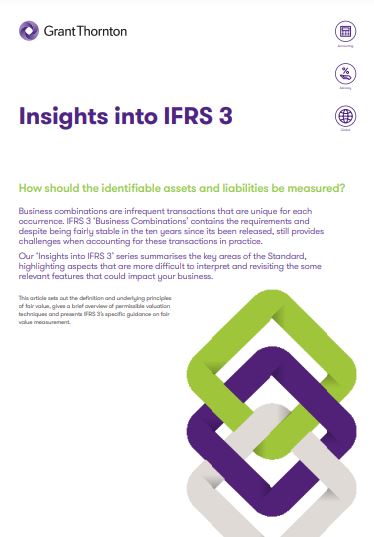
Our ‘Insights into IFRS 3’ series summarises the key areas of the Standard, highlighting aspects that are more difficult to interpret and revisiting the some relevant features that could impact your business.
This article sets out the definition and underlying principles of fair value, gives a brief overview of permissible valuation techniques and presents IFRS 3’s specific guidance on fair value measurement.
IFRS 3’s measurement principle
The identifiable assets acquired and liabilities assumed in a business combination are measured in accordance with the general measurement principle in IFRS 3 which states they should be measured at their acquisition-date fair values.
Definition
-
The price that would be received to sell an asset or paid to transfer a liability in an orderly transaction between market participants at the measurement date.
However, there are a few exceptions to this measurement principle, which are discussed in our article ‘Insights into IFRS 3 – Specific recognition and measurement provisions’. If an identifiable asset or liability has a quoted price in an active market (for example, listed shares), this price should be used as fair value.
However, few assets and even fewer liabilities have such quoted prices. So in many cases, fair value then needs to be estimated using a valuation technique. As a result estimating fair values can be a complex exercise requiring considerable management judgement and many acquirers engage professional valuation specialists to assist in this stage of the process.
A number of concepts are embodied in this definition. Firstly, it clarifies fair value is an ‘exit’ price – for example it refers to the transfer of a liability rather than settlement. Secondly, it assumes an orderly sale or transfer (ie not a forced transaction or a distressed sale).
Thirdly, there is an explicit reference to ‘market participants’, emphasising fair value is a market-based concept and not an entity specific value. Finally, IFRS 13 clarifies fair value is a current price at the measurement date (eg the acquisition date in a business combination).
Sign up for expert insights, industry trends, and key updates—delivered straight to you.









